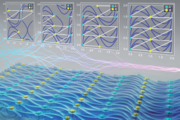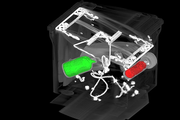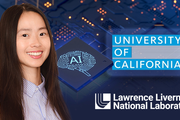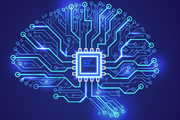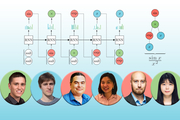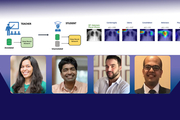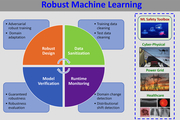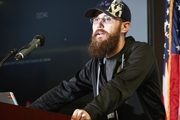Will it bend? Reinforcement learning optimizes metamaterials
Dec. 13, 2023-
Lawrence Livermore staff scientist Xiaoxing Xia collaborated with the Technical University of Denmark to integrate machine learning (ML) and 3D printing techniques. The effort naturally follows Xia’s PhD work in materials science at the California Institute of Technology, where he investigated electrochemically reconfigurable structures. In a paper published in the Journal of Materials...
For better CT images, new deep learning tool helps fill in the blanks
Nov. 17, 2023-
At a hospital, an airport, or even an assembly line, computed tomography (CT) allows us to investigate the otherwise inaccessible interiors of objects without laying a finger on them. To perform CT, x-rays first shine through an object, interacting with the different materials and structures inside. Then, the x-rays emerge on the other side, casting a projection of their interactions onto a...
LLNL, University of California partner for AI-driven additive manufacturing research
Sept. 27, 2023-
Grace Gu, a faculty member in mechanical engineering at UC Berkeley, has been selected as the inaugural recipient of the LLNL Early Career UC Faculty Initiative. The initiative is a joint endeavor between LLNL’s Strategic Deterrence Principal Directorate and UC national laboratories at the University of California Office of the President, seeking to foster long-term academic partnerships and...
LLNL researchers win HPCwire award for applying cognitive simulation to ICF
Nov. 17, 2022-
The high performance computing publication HPCwire announced LLNL as the winner of its Editor’s Choice award for Best Use of HPC in Energy for applying cognitive simulation (CogSim) methods to inertial confinement fusion (ICF) research. The award was presented at the largest supercomputing conference in the world: the 2022 International Conference for High Performance Computing, Networking...
LLNL team claims top AI award at international symbolic regression competition
Aug. 16, 2022-
An LLNL team claimed a top prize at an inaugural international symbolic regression competition for an artificial intelligence (AI) framework they developed capable of explaining and interpreting real-life COVID-19 data. Hosted by the open source SRBench project at the 2022 Genetic and Evolutionary Computation Conference (GECCO), the competition had two tracks—synthetic and real-world—and...
Introduction to deep learning for image classification workshop (VIDEO)
July 6, 2022-
In addition to its annual conference held every March, the global Women in Data Science (WiDS) organization hosts workshops and other activities year-round to inspire and educate data scientists worldwide, regardless of gender, and to support women in the field. On June 29, LLNL’s Cindy Gonzales led a WiDS Workshop titled “Introduction to Deep Learning for Image Classification.” The abstract...
Data Science Challenge welcomes UC Riverside
Oct. 11, 2021-
Together with LLNL’s Center for Applied Scientific Computing (CASC), the DSI welcomed a new academic partner to the 2021 Data Science Challenge (DSC) internship program: the University of California (UC) Riverside campus. The intensive program has run for three years with UC Merced, and it tasks undergraduate and graduate students with addressing a real-world scientific problem using data...
Laser-driven ion acceleration with deep learning
May 25, 2021-
While advances in machine learning over the past decade have made significant impacts in applications such as image classification, natural language processing and pattern recognition, scientific endeavors have only just begun to leverage this technology. This is most notable in processing large quantities of data from experiments. Research conducted at LLNL is the first to apply neural...
A winning strategy for deep neural networks
April 29, 2021-
LLNL continues to make an impact at top machine learning conferences, even as much of the research staff works remotely during the COVID-19 pandemic. Postdoctoral researcher James Diffenderfer and computer scientist Bhavya Kailkhura, both from LLNL’s Center for Applied Scientific Computing, are co-authors on a paper—“Multi-Prize Lottery Ticket Hypothesis: Finding Accurate Binary Neural...
Winter hackathon highlights data science talks and tutorial
March 24, 2021-
The Data Science Institute (DSI) sponsored LLNL’s 27th hackathon on February 11–12. Held four times a year, these seasonal events bring the computing community together for a 24-hour period where anything goes: Participants can focus on special projects, learn new programming languages, develop skills, dig into challenging tasks, and more. The winter hackathon was the DSI’s second such...
Novel deep learning framework for symbolic regression
March 18, 2021-
LLNL computer scientists have developed a new framework and an accompanying visualization tool that leverages deep reinforcement learning for symbolic regression problems, outperforming baseline methods on benchmark problems. The paper was recently accepted as an oral presentation at the International Conference on Learning Representations (ICLR 2021), one of the top machine learning...
'Self-trained' deep learning to improve disease diagnosis
March 4, 2021-
New work by computer scientists at LLNL and IBM Research on deep learning models to accurately diagnose diseases from X-ray images with less labeled data won the Best Paper award for Computer-Aided Diagnosis at the SPIE Medical Imaging Conference on February 19. The technique, which includes novel regularization and “self-training” strategies, addresses some well-known challenges in the...
CASC research in machine learning robustness debuts at AAAI conference
Feb. 10, 2021-
LLNL’s Center for Applied Scientific Computing (CASC) has steadily grown its reputation in the artificial intelligence (AI)/machine learning (ML) community—a trend continued by three papers accepted at the 35th AAAI Conference on Artificial Intelligence, held virtually on February 2–9, 2021. Computer scientists Jayaraman Thiagarajan, Rushil Anirudh, Bhavya Kailkhura, and Peer-Timo Bremer led...
Lab researchers explore ‘learn-by-calibration’ approach to deep learning to accurately emulate scientific process
Feb. 10, 2021-
An LLNL team has developed a “Learn-by-Calibrating” method for creating powerful scientific emulators that could be used as proxies for far more computationally intensive simulators. Researchers found the approach results in high-quality predictive models that are closer to real-world data and better calibrated than previous state-of-the-art methods. The LbC approach is based on interval...
NeurIPS papers aim to improve understanding and robustness of machine learning algorithms
Dec. 7, 2020-
The 34th Conference on Neural Information Processing Systems (NeurIPS) is featuring two papers advancing the reliability of deep learning for mission-critical applications at LLNL. The most prestigious machine learning conference in the world, NeurIPS began virtually on Dec. 6. The first paper describes a framework for understanding the effect of properties of training data on the...
DL-based surrogate models outperform simulators and could hasten scientific discoveries
June 17, 2020-
Surrogate models supported by neural networks can perform as well, and in some ways better, than computationally expensive simulators and could lead to new insights in complicated physics problems such as inertial confinement fusion (ICF), LLNL scientists reported. Read more at LLNL News.
Lab team studies calibrated AI and deep learning models to more reliably diagnose and treat disease
May 29, 2020-
A team led by LLNL computer scientist Jay Thiagarajan has developed a new approach for improving the reliability of artificial intelligence and deep learning-based models used for critical applications, such as health care. Thiagarajan recently applied the method to study chest X-ray images of patients diagnosed with COVID-19, arising due to the novel SARS-Cov-2 coronavirus. Read more at LLNL...
AI identifies change in microstructure in aging materials
May 26, 2020-
LLNL scientists have taken a step forward in the design of future materials with improved performance by analyzing its microstructure using AI. The work recently appeared online in the journal Computational Materials Science. Read more at LLNL News.
Deep learning may provide solution for efficient charging, driving of autonomous electric vehicles
Feb. 4, 2020-
LLNL computer scientists and software engineers have developed a deep learning-based strategy to maximize electric vehicle (EV) ride-sharing services while reducing carbon emissions and the impact to the electrical grid, emphasizing autonomous EVs capable of offering 24-hour service. Read more at LLNL News.
Speech generation: siblings collaborate on machine learning hackathon project
May 28, 2019-
The first recording that brothers Sam and Joe Eklund, along with their colleague Travis Chambers, played for the audience was a validation.
“I endorse Travis as president of the United States of America,” the audio clip played, in a voice resembling Barack Obama’s.
The second, in the same voice, was a declaration: “Ice is back, our brand new invention” (from the song “Ice Ice Baby” by...

